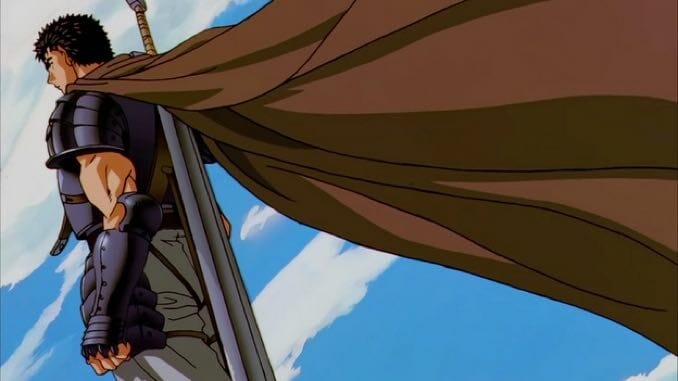Why Berserk‘s Sensitive Portrayal of Toxic Masculinity Was Revolutionary
Remembering OLM, Inc.’s woefully flawed, yet strangely evocative 1997 adaptation.
Photo Courtesy of OLM
OLM, Inc.’s 1997 adaptation of the late Kentaro Miura’s seinen classic Berserk continues to be the manga’s definitive onscreen portrayal, despite only covering the series’ first arc. This section of Berserk, the “Golden Age Arc” is—on the surface—a quintessential action-fantasy plot. Behind its macho veneer, however, lies a moody world of intrigue and horror, all led by an intricate web of relationships mostly centered around three people: Guts, a vagabond-turned-mercenary; Griffith, the ambitious and charismatic leader of the Band of the Falcon mercenary group; and Casca, the Band’s unit commander and one of Midland’s few female warriors.
The anime follows the three as they toil with fame and trauma in the twilight years of the Hundred-Year War, a century-long conflict between the show’s main setting of Midland and the neighboring Tudor Empire. The Band of the Hawk proves instrumental in several key battles and, eventually, claim victory for Midland that effectively ends the war. As celebrated mercenaries, Griffith joins the inner court of Midland’s nobles while Casca and Guts contend with their burgeoning feelings for one another—as well as their fluctuating loyalties to Griffith, who values his dream of glory above all else.
Berserk is a story about pain and loss, but more so about the neverending journey towards something that makes us feel whole. To dream is to be emotionally vulnerable—dreaming, in Berserk, is inherently a foolish thing to do, something that leads to heartache and dashed hopes. In this way, Berserk is not a story about morality. It is not concerned with right from wrong. It is only concerned with the desires people have and what they are willing to do to achieve and protect their overflowing wants.
The epicenter of this theme is, of course, Griffith, a man who came from little and strives for his very own kingdom. Griffith is strikingly beautiful and effeminate, with long, white hair and intensely blue eyes. He isn’t traditionally masculine in any sense other than his overwhelming prowess on the battlefield. His true strength, though, lies in his charm; he’s a person who can get what he wants by using others, and thus considers himself the owner of people indebted to him. That’s exactly what his relationship with Guts is predicated on—a sense of entitlement, of masterhood.
Guts is emotionally reserved to the point of frigidity. He’s also broad-shouldered, musclebound, and wields an impossibly big sword. He’s the perfect foil to Griffith; where Griffith is delicate yet fierce, Guts is hulking and afraid to investigate his identity. Burned by the people of his past, he chooses not to trust others and not to give much thought to anything other than survival. He’s content (but not pleased) to be Griffith’s right hand because it’s something to do, something static and unchanging. He doesn’t have to grow or morph to adapt to the situations the Band finds themselves in—until he does.
Griffith’s philosophy is predicated on the strong taking what they want by sheer force of will, and using what tools and opportunities are available to him. One manner in which he does this is through using his very body. Autonomy and free will are intrinsically connected in Berserk—our control over our own bodies must be wrested from the fraught society they operate in to truly be free. Even Griffith struggles to control his own body at all times. One of the show’s most precarious elements is how it handles sexuality, and the frequency in which sexual assault is portrayed. Nearly every character is a survivor of some sort of encounter, and Griffith is no exception. In order to jumpstart the Band in its early days, Griffith slept with a pederast noble for funding. Griffith later assures the noble he is unmoved by this transaction—it was merely a means to an end, effectively severing his mind from the trauma his body faces.
Guts isn’t so capable of separating the two. To Guts, his body is his mind; the pain he feels is always physical, and he channels any mental anguish he might encounter through his sword. His emotional state stems from his childhood, when his adoptive father brutally inducted him into his own band of mercenaries, and later attempted to kill Guts for an accident beyond his control. The anime lives out a crucial segment where Guts, too, is peddled off to a pedophile in exchange for money, perhaps in an attempt to salvage Guts’s hypermasculine image. This is perhaps one of the anime’s greatest failings as an adaptation of Miura’s manga. Though I don’t revel in the series’ frequent deployment of sexual assault as a means to communicate power imbalances, this early infringement on Guts’s body robs the viewer of a queer interpretation for why Guts is so eager to form a lasting, equitable bond with Griffith, and also why he and Casca are so drawn to each other despite their inherent differences.